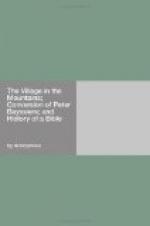Soon, however, the thought returned; and as I reflected on that declaration of St. Paul, “All that will live godly in Christ Jesus shall suffer persecution,” 2 Tim. 3:12, possibly, said I, these protestants may be calumniated on the very ground of their religion being more in accordance with the Gospel. Many other passages of Scripture presented themselves to my mind, which led me to believe that this supposition might be correct. I therefore determined to lose no opportunity of clearing my doubts upon this point.
As there were no protestants either in our town or neighbourhood, whom I could consult, I determined to write to the only one I knew; and though but little acquainted with her, I ventured to request that I might be apprised of, her pastor’s next visit, signifying that I was anxious to consult him on a subject of importance. Either she did not understand my letter, or from some other motive, her answer, though obliging was not satisfactory on that point which most interested me.
I waited patiently for some time, and applied myself diligently to reading and meditating on the word of God, which had become like necessary food to my soul. In all my prayers I entreated the Lord that he would condescend to direct me to those true Christians of whom his church was composed, and permit me to become one of their number. I felt a confidence, from all that I had experienced, that my divine Benefactor would grant my request whenever he saw it good for me; this confidence quieted me, but could not remove my desire to ascertain what the protestant religion really was.
One day, particularly, this anxiety became stronger than ever, and degenerated, I acknowledge, into real impatience. I was unhappy at my lonely and isolated situation, without a friend to whom I could communicate my dearest interests; I believe I could have gone a hundred miles to have found any one who thought and felt as I did. It was at this moment of perplexity and weariness, on my return home, at the close of a day’s work, that the thought struck me of consulting my wife, your present mother, and I had a presentiment that through her I should discover what I so long wished to know. She is, as you know, a native of Libos, and I remembered having heard her say that there were protestants residing in that town and neighbourhood.
When the supper was ended, and we were seated by the fire, each in our chimney-corner, she took her work, and I began the conversation nearly in the following words:
“Annette,” said I, “have I not heard you say that there are many protestants in Libos and the neighbourhood?”
“Yes, Bayssiere,” she replied, “there are a great many, but they are a good deal scattered about the country. They belong to the church of Mont Flanquin, where their priest or minister resides.”
“And do you know any of them? Have you ever spoken to them, or been at their houses?”
“O yes, I was acquainted with many families; I knew Mr. ——, and Mr. ——, &c. &c. (I suppress names.) I have been employed in their houses, and seen them frequently.”




